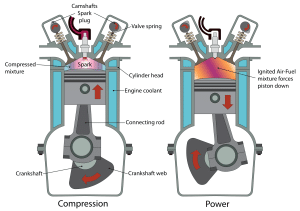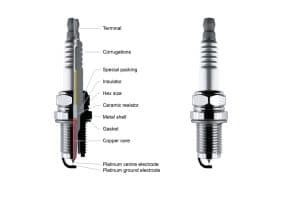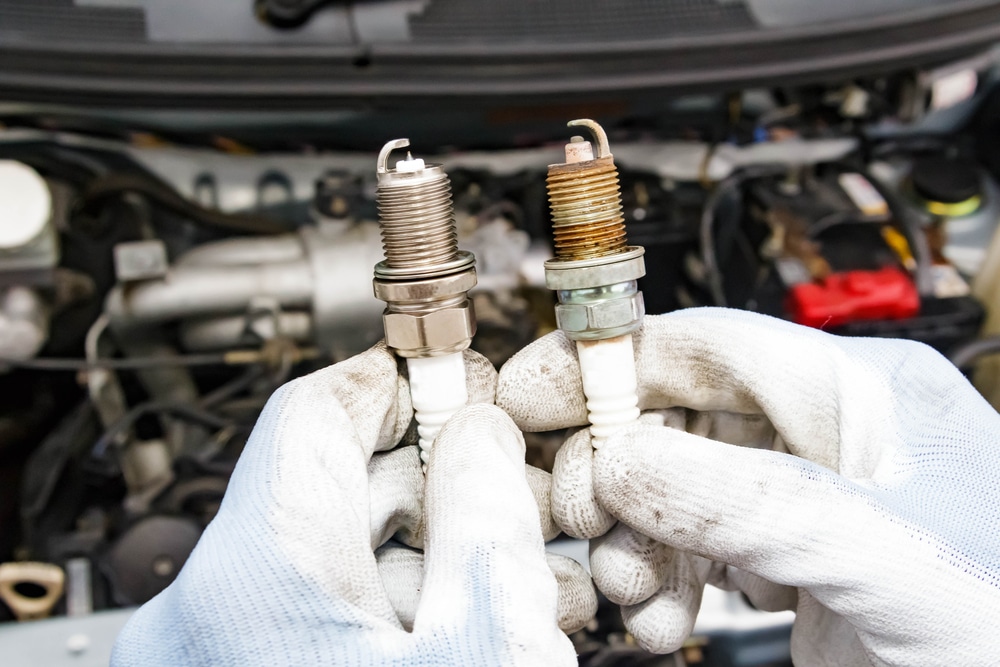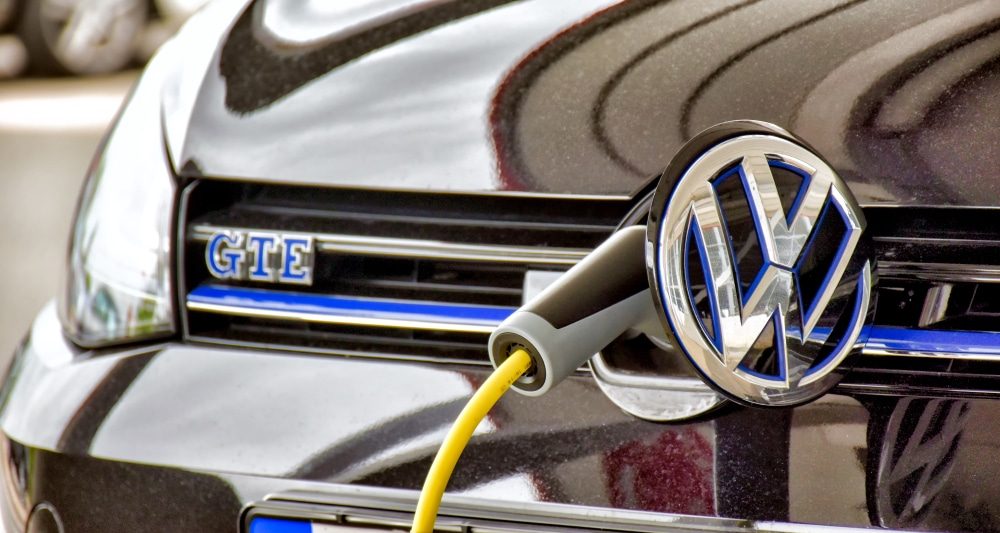Spark Plugs
Your car suddenly grinds to a halt. Without warning. On the A232 near Croydon during rush hour. With rain pouring down and surrounding traffic building. Heart-stopping.
The culprit? A spark plug you neglected for too long. The repair bill? Painfully expensive.
These tiny components, roughly the size of a golf tee, determine whether your journey continues smoothly or ends with an emergency call to roadside assistance. They provide the vital ignition spark that transforms fuel into forward motion.
When was the last time you gave yours any thought?
Read on to discover why these unassuming parts deserve far more attention than most Croydon drivers realise.
What Do Spark Plugs Do? Understanding Their Role
Your car’s engine is a marvel of engineering, with hundreds of components working harmoniously together. At the centre of this sits the spark plug – an ingenious component that generates thousands of precisely timed sparks each minute to ignite the compressed fuel-air mixture within your engine’s combustion chambers.
Despite being small, these components are absolutely fundamental to your petrol engine’s functionality. They’re positioned within your engine’s cylinder head, carefully threaded into individual cylinders. A four-cylinder engine utilises four spark plugs; six-cylinder engines incorporate six. However, exceptions exist – particularly in advanced engine designs that have dual-spark technology where two spark plugs serve each cylinder.
Consider this practical comparison: the spark plug functions similarly to your home boiler’s ignition system. Each time your heating activates, an ignitor creates a small electrical spark that lights the gas. Spark plugs perform an identical role in your vehicle, but with one critical difference – each must generate sparks several thousand times per minute under extreme conditions. Should these sparks fail to materialise at precisely the right moment, the fuel-air mixture won’t ignite, pistons cease to move, and your engine stalls entirely.

Selecting the Correct Spark Plugs for Your Car
Many drivers mistakenly assume any spark plug will suffice for their vehicle. This misconception couldn’t be further from reality. Your car was designed to operate with a specific spark plug type, and installing alternatives risks significant damage. Consider these differences:
- Electrode Material: Modern spark plugs feature electrodes manufactured from various conductive metals, including copper, platinum, and iridium. Each material has distinct characteristics, longevity profiles, and price points. Typically, iridium plugs last the longest, while copper versions, though excellent conductors, require replacing more frequently.
- Design & Size: Significant variations exist across spark plug designs – thread size, reach (determining how far the plug extends into the combustion chamber), and electrode configuration. You should never deviate from the spark plugs your engine needs or you’ll risk incorrect combustion and engine damage.
- Heat Range: The heat range is one of the most frequently overlooked aspects of spark plugs. It indicates how efficiently the plug dissipates combustion heat from its electrode tip. Various plugs have different thermal behaviours, some rapidly transfer heat away, while others retain it longer. Selecting a spark plug with the wrong heat range risks consequences ranging from degraded acceleration response to potentially catastrophic engine and catalytic converter damage. This is why manufacturer specifications should never be overlooked.
Vehicle manufacturers advise which spark plug your engine requires following exhaustive testing programmes. At Smith’s of London, we exclusively install manufacturer-approved, premium-quality (OEM) components to ensure optimal reliability.
(OEM stands for Original Equipment Manufacturer. When it comes to vehicle parts, this means the parts are made by the same company that produced the original parts for the vehicle manufacturer)
Identifying the correct spark plug is only the start, though. Your spark plugs also need to be fitted to perfection. One false move, and you’ll be left with performance issues, engine troubles, and a sky-high repair bill.
Are you unsure which spark plugs your particular vehicle needs? Call our Croydon garage on 020 8674 3377 for expert guidance!

Factors That Impact Your Spark Plugs’ Effectiveness
Spark plugs can wear out or lose effectiveness over time for several reasons:
- Journey Patterns: Your driving habits significantly influence spark plug condition. Regular short journeys, particularly in congested Croydon and Beckenham traffic, prevent engines from reaching the optimal operating temperature. Your engine will run rich, landing your spark plugs with carbon buildup. This can manifest in rough idling, hesitant acceleration, and increased fuel consumption. Making occasional extended journeys along clearer routes helps maintain appropriate combustion conditions that extend spark plug lifespan.
- Overall Engine Health: Your engine’s overall health directly impacts spark plug longevity. Oil leaks, incorrect air/fuel mixture, or cooling system issues don’t just affect your engine – they compromise your spark plugs, too. Regular maintenance of all engine systems ensures your spark plugs deliver optimal performance throughout their service life.
- Petrol Quality: The fuel you select influences spark plug condition over time. While British fuel standards are generally good, premium formulations typically contain enhanced cleaning compounds that minimise deposit formation on critical components. Particularly for modern or high-performance cars, using higher-grade fuels with effective detergent additives helps preserve spark plug efficiency and extend their operational lifespan.
- Thermal Characteristics: Spark plugs must run within specific temperature parameters – neither excessively hot nor cold. Operating below optimal temperatures encourages carbon accumulation, while excessive heat risks inducing pre-ignition (fuel combusting before the timed spark occurs), potentially damaging internal engine components. Vehicle manufacturers have determined precisely which spark plug your specific engine requires, and Smith’s of London won’t deviate from that.
Warning Signs of Worn-Out Spark Plugs
Though physically compact, deteriorating spark plugs generate noticeable symptoms that attentive drivers can identify before complete failure occurs:
- Engine Misfires & Performance Issues: As spark plugs deteriorate, their reduced efficiency manifests in many ways. Telltale indicators include acceleration becoming less responsive, ‘rough idling,’ and declining fuel efficiency. Left unaddressed, these incomplete combustion cycles can damage expensive catalytic converters, turning a straightforward maintenance issue into a significantly costlier repair.
- Starting Difficulties: When your engine takes longer than usual to start, particularly during Croydon’s colder winter mornings, spark plug degradation has likely contributed to the problem. Worn electrodes struggle to generate adequate spark for initial combustion. This symptom typically intensifies gradually until, eventually, the engine fails to start altogether.
- Check Engine Light: Modern engine management systems constantly monitor for misfires. When spark plugs fail to ignite the fuel-air mix properly, your vehicle may illuminate the check engine warning light on your dashboard.
A particular challenge is that these symptoms often resemble other potential engine management issues, making them hard to diagnose. If you notice any of these warning signs, contact Smith’s of London promptly on 020 8674 3377 rather than risking a breakdown on busy South London roads.
The Professional Way to Change Spark Plugs
Professional spark plug replacement demands specialised equipment, technical expertise, and attention to detail.
Accessing these components begins by removing the protective engine cover and associated components. Once exposed, our technicians carefully extract each original spark plug using a calibrated spark plug socket tool.
Before installing replacement units, we verify complete compatibility with manufacturer specifications. We also carefully clean the surrounding area to ensure no dirt enters the cylinder. When installing, we always thread the plugs in by hand, then tighten them to the exact torque your manufacturer recommends. Finally, we put everything back together and run the engine to ensure everything performs optimally.
Without the professional touch, numerous complications can arise:
- Seized plugs may fracture during removal, necessitating specialised extraction procedures
- Incorrect installation torque potentially causes compression leakage or thread damage
- Cross-threading during installation risks expensive cylinder head damage
- Inappropriate plug selection leads to potential ongoing performance issues
- Contamination entering cylinders during the procedure causes internal engine wear
Smith’s of London technicians bring extensive, model-specific experience to every spark plug replacement service we perform.
We exclusively use manufacturer-approved components and regularly calibrated torque wrenches to ensure precise installation. This methodical approach ensures vehicles run smoothly after a service at our Croydon workshop.
Replace Spark Plugs Before They Let You Down
Look, we understand—no one wants to replace parts unnecessarily, particularly when you weren’t aware there was a problem with them. However, with spark plugs, postponing scheduled replacement is a false economy. The modest cost savings today invariably land you with substantially higher bills tomorrow, typically arriving at the most inconvenient time!
The Ideal Time to Fit New Spark Plugs
Recommended replacement intervals vary substantially depending on the specific spark plug technology installed:
- Conventional Copper Core Plugs deteriorate most rapidly – they represent the smallest initial investment but demand more frequent replacement cycles
- Enhanced Platinum Variants command a higher price point and last longer than copper versions
- Premium Iridium Plugs represent the highest initial investment but last by far the longest.
While these performance differences exist, it’s crucial to understand you don’t really have a choice! Your car’s engine was calibrated for specific spark plugs, and deviating from manufacturer specifications risks performance problems and potential engine damage.
Replacing your spark plugs when recommended isn’t just suggested maintenance; it’s essential protection against large repair bills. At Smith’s of London, we always follow the manufacturer’s recommendation for the best results. It’s just not worth the risk!
Debunking Popular Spark Plug Misconceptions
Throughout our extensive service experience across Croydon, Beckenham and Coulsdon, Smith’s of London technicians have encountered numerous misconceptions regarding spark plugs. Here are some of them:
“Modern spark plugs last forever.”
This assumption leads many drivers to completely overlook crucial maintenance. While contemporary spark plugs certainly outlast previous generations, they remain consumable components subject to gradual deterioration. Every minute exposes them to electrical sparking, extreme heat, and combustion byproducts that progressively erode electrode materials. Even premium iridium-tipped variants wear down. Adhering to manufacturer-specified replacement intervals isn’t optional – it’s fundamental to maintaining engine reliability and efficiency.
“Spark plugs only affect starting the engine.”
Some motorists incorrectly believe spark plugs function solely during the starting cycle, becoming redundant once the engine operates. In reality, these components remain continuously active throughout every journey. While they certainly get the engine started, they continue to deliver precisely timed sparks throughout your journey.
“All spark plug designs are the same.”
Not true! Spark plugs come in various types (copper, platinum, iridium), with different heat ranges and electrode designs specifically engineered for your engine. Using the wrong kind can lead to poor performance, reduced fuel economy, or even engine damage. The manufacturer specifies the exact plug type for a reason – it’s been carefully matched to your engine’s compression ratio, operating temperature, and combustion chamber design.
“If one spark plug is bad, only that one needs replacing.”
This false economy inevitably leads to repeated workshop visits, which cost more overall. Spark plugs deteriorate at broadly comparable rates due to identical operating conditions. When one unit fails, its companions are probably heading the same way. That’s exactly why car manufacturers tell you to replace them all at once in your service schedule – not one at a time. Save time and money by replacing the whole set when maintenance is due.
Spark Plugs: Leave It To The Professionals
Like many aspects of car maintenance, spark plugs benefit from a proactive approach rather than waiting for a reactive emergency intervention. Unfortunately, most motorists discover the importance of these components only after a failure occurs, when substantial damage has already occurred.
At Smith’s of London, we believe that prevention easily beats repair! Our comprehensive service philosophy has earned us the following:
- A {{average-rating}} star Google rating from {{review-count}} satisfied customers
- Recognition throughout South London for transparent pricing and exceptional value
With us, you’ll benefit from:
- Our comprehensive 12 months parts and labour guarantee on all work performed
- Investment in specialist diagnostic equipment for accurate spark plug inspection
- A commitment to only using manufacturer-specified, premium OEM parts
Why compromise engine performance or reliability? Contact our Croydon workshop today on 020 8674 3377. Our experienced specialists stand ready to provide straightforward, honest advice keeping your vehicle operating safely and efficiently throughout Croydon, Beckenham and Coulsdon.



